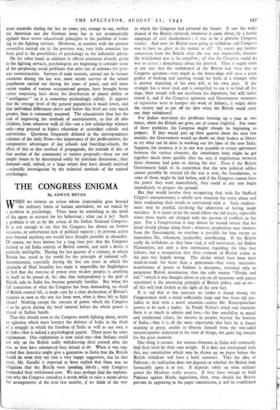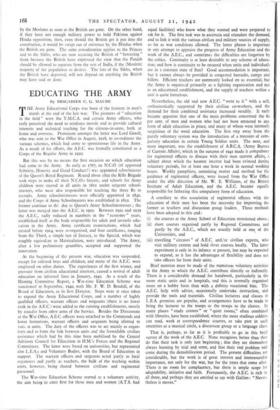THE CONGRESS ENIGMA
By EDWYN BEVAN
WHEN we witness an action whose irrationality goes beyond the ordinary limits of human unwisdom, we are teased by a problem in psychology. There must be something in the mind of the agent to account for his behaviour ; what can it be? Such a problem is set us by the action of the Indian National Congress. It is not enough to say that the Congress has shown on former occasions an unfortunate lack of political sagacity ; its present action goes beyond anything one would have thought possible in absurdity. Of course, we have known for a long time past that the Congress desired to rid India entirely of British control, and such a desire is perfectly intelligible. During the last quarter of a century, in which Britain has stood in the world for the principle of national self- determination, especially during the last ten years in which the spectacle of Nazi brutality has made it impossible for Englishmen to feel that the exercise of power over weaker peoples is anything in itself to be proud of, the idea that independence is the goal of British rule in India has become generally familiar. But when the full concession of what the Congress has been demanding, no shred of British control left, is made sure by a clear declaration of Britain's purpose as soon as the war has been won, what is there left to fight about? Nothing except the amount of power which the Congress is to be given during the brief interval before the whole power is placed in Indian hands.
That this should seem to the Congress worth fighting about, worth an agitation which must hamper the defence of India in the thick of a struggle in which the freedom of India as well as our own is at stake—that is indeed a psychological puzzle. There must be some explanation. One explanation is noW ruled out—that Indians could not rely on the British really withdrawing their control after the war, as they have announced they intend to do. When it was sug- gested that America might give a guarantee to India that the British would do what they say (not a very happy suggestion, but let that pass), Mr. Gandhi is reported to have replied that there was no allegation that the British were speaking falsely ; only Congress demanded their withdrawal now. We may perhaps find the explana- tion why the Congress considers it worth while to raise a storm about the arrangements of the next few months, if we think of the way
in which the Congress bad pictured the future. It saw the with-, drawal of the British enforced, whenever it came about, by a heroic
campaign of civil disobedience ; it was to be a glorious Congress victory. And now the British were going to withdraw and Congress was to have no glory in the matter at all! To extort any further concession from the British after the war was impossible, because the withdrawal was to be complete ; all that the Congress could do was to create a disturbance about the interval. Then it might seem at any rate that the withdrawal of the British had been due to Congress agitation—very much as the house-dogs will raise a great pother of barking and snarling round the heels of a stranger who is anyway departing of his own will, at his own pace. If the stranger has a stout stick and is compelled to use it to fend off the dogs, their assault will not accelerate his departure, but will rather retard it, and if the Congress agitation and Government measures of repression were to hamper the work of defence, it might delay the victory and so put off the date when the British could carry out their withdrawal.
For Indian statesmen the problems looming up a year or two hence, when the British are gone, are of course frightful. For some of these problems the Congress might already be beginning to prepare. If they would give up their quarrel about the next few months, the Government would no doubt set their leaders at liberty to try what can be done in marking out the lines of the new India. Suppose, for instance, it is in any way possible to secure agreement between the various elements, the constituent body might be got together much more quickly after the war, if negotiations between these elements had gone on during the war. Even if the British Government holds to its contention that the new political edifice cannot possibly be erected till the war is over, the foundations, or some of them, might be laid before, and if the Congress cannot have the power they want immediately, they could at any rate begin immediately to prepare the ground.
But that would involve their recognising that, with Sir Stafford Cripps's announcement, a wholly new situation has come about and their readjusting their minds to correspond with it. Such readjust- ment may be painful, involving the admission of having made mistakes. It is easier to let the mind follow the old tracks, especially when those tracks are charged with the passion of conflicts in the past. For a Congressman it may almost be second nature that his mind should plunge along them ; whatever proposition may emanate from the Government, no reaction is possible for him except an immediate No, vehement, instinctive, unreflecting. If the British really do withdraw, as they have said, it will necessitate, for Indian Nationalists, not only a new orientation regarding the time that follows, but a recognition that their estimate of British action in the past was largely wrong. The clichés which have been their stock-in-trade for more than a generation—that every successive transference of power to Indians is deceptive, intended only to perpetrate British domination, that the stale maxim " Divide and rule" (which it was thought clever to cite on all occasions with parrot repetition) is the unvarying principle of British policy, and so on— all this will look foolish in the light of the new fact.
It is sad that at this juncture . no leader is found among the Congressmen with a mind sufficiently large and free from old pre- judice to deal with a novel situation—unless Mr. Rajagopalachari proves to be such a leader. In Pandit Nehru's mind and character there is so much to admire and love,—his fine sensibility to moral and intellectual values, his interest in peoples beyond the horizon of India,—that it is all the more regrettable that here he is found wanting in grasp, unable to liberate himself from the one-sided misconceptions indurated in his view of things, not quite big enough for the great moment.
One thing is certain: the various elements in India will eventually find their level by their own weight. If it does not correspond with this, any constitution which may be drawn up on paper before the British withdraw will have a brief existence. Take the idea of Pakistan ; its realisation does not depend on whether the British look favourably upon it or not. It depends solely on what military power the Moslems really possess. If they have enough to hold Pakistan against Hindu opposition, then, even should the British prevent its appearing in the paper constitution, it will be established by the Moslems as soon as the British are gone. On the other hand, if they have not enough military power to hold Pakistan against Hindu opposition, then, even should the British get it put into the constitution, it would be swept out of existence by the Hindus when the British are gone. The same consideration applies to the Princes and to the Sikhs, who are now accusing the British of " betraying " them because the British have expressed the view that the Punjab should be allowed to separate from the rest of India, if the (Moslem) majority of the population so desires. The fate of the Sikhs, when the British have departed, will not depend on anything the British may have said or done.



























 Previous page
Previous page